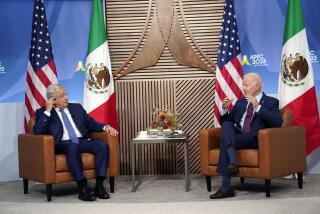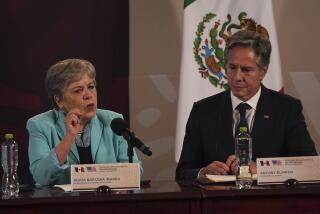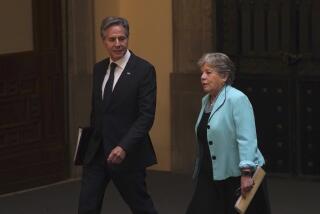Leaders of N. America hold talks
ottawa -- Against the backdrop of renewed angst over trade and immigration, President Bush began a two-day summit Monday with his Canadian and Mexican counterparts, seeking to enhance border security while keeping relations on an even keel.
The meetings with Canadian Prime Minister Stephen Harper and Mexican President Felipe Calderon were his first with each since Democratic presidential candidates in a debate this month raised the prospect of scrapping, or at least renegotiating, the North American Free Trade Agreement. And congressional and administration efforts to rewrite U.S. immigration laws have melted down since Bush last met with the pair.
Flying here from Texas, where he had been on vacation for a week at his ranch near Crawford, Bush met in the resort of Montebello, about 40 miles east of Ottawa, first with Harper and then with Calderon. The trio were also to dine together in a massive cedar log chateau and discuss hemispheric issues.
With lower-level officials reporting progress in working out new U.S.-Mexican anti-drug measures, Bush and Calderon “expressed interest in a common strategy to deal with a common threat,” said Dan Fisk, the U.S. National Security Council’s director of Western Hemisphere affairs.
Fisk said Bush told Harper that the United States would not back off a plan to require all Americans returning to the United States from Canada and Mexico to carry passports beginning Jan. 1. Canadians fear the provision will cut down on tourism and routine shopping trips from its neighbor, with which it does about $1.4 billion of business a day, the NSC official said.
The three North American nations are looking for ways to avoid potential cross-border traffic tie-ups, and economic distress, that could follow a terrorist attack or other security threat such as an outbreak of avian flu.
Before Bush arrived, several hundred demonstrators gathered beyond a security fence surrounding the resort, the site of a summit of the leading industrialized democracies in 1981.
On Sunday, an estimated 1,000 people demonstrated in Ottawa, and the headline in Monday’s Ottawa Sun read: “Bush told to go home.”
In Montebello, riot police used tear gas to repel what the Reuters news agency reported were about 150 people confronting police lines.
The demonstrators represented a variety of causes and complaints, but to some extent reflected the difficulties that Harper, leading a minority government, faces in moving ahead with any agenda that seeks closer ties with the United States under the banner of enhanced North American security and economic cooperation.
“They are waving the nationalistic Canadian flag, forewarning of encroachment on Canadian sovereignty,” said Armand Peschard-Sverdrup, director of the Mexico Project at the Center for Strategic and International Studies, a Washington think tank.
Gordon Johndroe, spokesman for the U.S. National Security Council, said the summit allowed the leaders to focus on issues “from trade to border security.”
Reflecting that agenda, Bush was accompanied on Air Force One by Michael Chertoff, secretary of Homeland Security, and Commerce Secretary Carlos M. Gutierrez.
For all the handshakes and smiles, and the mutual reliance on cross-border trade, the United States and Canada regularly need to sand down the rough edges in their relations, the most current trouble spot being Ottawa’s concern over the passport requirement.
In addition, Canada has asserted its view that the Northwest Passage through Arctic waters is Canadian territory. With the prospect that warming global temperatures will make natural resources of the ice-bound area increasingly accessible, competition between Canada and Russia has grown. Early this month, two Russian submarines journeyed to the seabed beneath the North Pole, where one planted a Russian flag.
“We look at the Northwest Passage as an international waterway, and want the international transit rights to be respected there,” Johndroe said.
--
More to Read
Sign up for Essential California
The most important California stories and recommendations in your inbox every morning.
You may occasionally receive promotional content from the Los Angeles Times.









